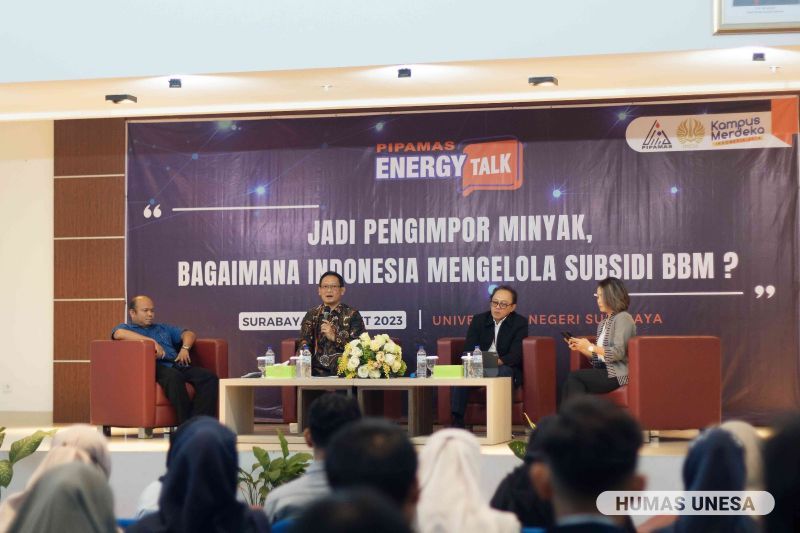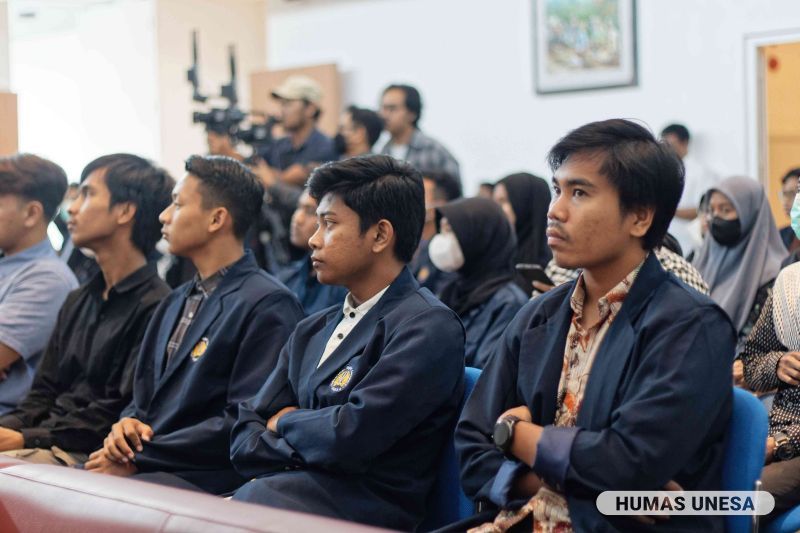UNESA Energy Audit Expert Discusses Fuel Subsidy Management in Pipamas Energy Talk

Unesa.ac.id, SURABAYA - Indonesia's fuel production is not sufficient for domestic needs, so the government is forced to import which on the other hand the consequences can be detrimental to national interests. Therefore, Indonesia struggles to increase domestic production to reduce import dependence and increase export earnings.
This was conveyed by an energy audit expert and lecturer at the Faculty of Engineering (FT) of Surabaya State University (UNESA), Dr. Mohammad Affendy, S.T. M.T., in the Pipamas Energy Talk organized by PT Pipamas and UNESA at the 9th Floor Auditorium, Faculty of Medicine (FK), Lidah Wetan Campus, on Monday, March 13, 2023.

In the event, there were also other speakers, Prof. Dr. Rudi Purwono as Economist of Airlangga University and Deden Mochammad Idhani as Area Manager of Communication, Relation, & CSR of PT Pertamina Patra Niaga. They were moderated by Putri Ayuningtyas, a broadcast journalist.
The FT UNESA lecturer added that Indonesia's oil production is around 800 thousand barrels per day. While domestic needs reach more than 1.5 million barrels per day. He hopes that this activity can increase understanding to students and the academic community about the condition of fuel and the policies that surround it.
“In addition, how Pertamina's programs related to distribution or how to use subsidized fuel in accordance with vehicle criteria. In addition, it also discusses renewable energy issues, the potential for a fuel crisis, steps to make fuel subsidies right on target, including steps to reduce excessive fuel consumption,” he said.
Meanwhile, Deden Mochammad Idhani said that the nature of subsidized fuel is in a limited number of subsidized products where the consumer users are only certain targets that need to be recorded. Based on data on JBT-PERPRES 191/2014 diesel oil user consumers, including land transportation, fisheries business, public / government services, water transportation, agricultural businesses, to micro / SME businesses.
“Parties who use where the deviation / misappropriation of subsidized fuel can be subject to criminal sanctions in accordance with applicable regulations,” he said.
So to overcome this imbalance, what the government does is require consumers who use subsidized fuel (JBT diesel and JBKP pertalite) to register their vehicles to separate eligible and ineligible user consumers. Pertamina then checks and matches data including determining consumers to help those entitled to subsidized products to be better served.
The benefits of implementing this program include 1) from the local government sector, it is able to help increase local revenue associated with an increase in PBBKB from the rate of fuel sales and assist in the process of monitoring the distribution of subsidized fuel to the public in accordance with Presidential Regulation 191/2014. 2) from the community sector, consumers receive subsidized fuel with valid data certainty, queue time becomes shorter, and the community is educated regarding the provisions of subsidized fuel distribution.
Then, 3) from the gas station sector, being able to help fuel services to the community without worrying about whether or not they are entitled to receive subsidies.
As for responding to the fuel crisis, Prof. Dr. Rudi Purwono said that Indonesian people's consumption of fuel is very high compared to the industry's ability to produce. This can be seen in the quality of domestic fuel production, which based on APBN data, continues to decline every year.
Even per-2023, it is targeted that the availability of oil is around 600 thousand barrels per day which is then faced with the need for more than that which reaches 1,500,000 barrels per day. Therefore, a good production management is needed to see the following years, not just talking for today. “So between needs and production must be monitored continuously so that there is no crisis,” he said. []
***
Author: Saputra and Azhar
Editor: @zam Alasiah*
Photo: UNESA Public Relations Team Documentation
Share It On: